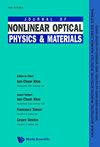Patterning of organic semiconductor crystal arrays via microchannel-assisted inkjet printing for organic field-effect transistors
IF 2.3
4区 物理与天体物理
Q2 OPTICS
引用次数: 3
Abstract
Inkjet printing technique provides a low-cost way for large-area construction of the patterned organic semiconductors toward integrated organic electronics. However, because of a lack of control over the wetting and dewetting dynamics of organic inks, inkjet-printed organic semiconductor crystals (OSCCs) are frequently plagued by the ‘coffee ring’ effect and uncontrollable growth process, leading to an uneven crystal morphology and disordered orientation. Here, we report a universal microchannel-assisted inkjet printing (MA-IJP) method for patterning of OSCC arrays with ordered crystallographic orientation. The micro-sized channel template not only provides a unidirectional capillary force to guide the wetting process of organic inks, but also confines the evaporation-induced dewetting behavior, enabling the long-range ordered growth of OSCCs. The patterned 2,7-dioctyl[1]benzothieno[3,2-b][1]benzothiophene (C8-BTBT) crystals present one-dimensional structures with a pure (010) crystallographic orientation. The 7 × 7 discrete organic field-effect transistor array made from the patterned C8-BTBT crystals exhibits a high average mobility up to 3.23 cm2 V−1 s−1 with a maximum mobility of 5.36 cm2 V−1 s−1. Given the good generality of the patterning process and high quality of the obtained OSCC crystal array, it is anticipated that our MA-IJP approach will constitute a major step toward integrated electronic and optoelectronic devices.用微通道辅助喷墨印刷有机场效应晶体管的有机半导体晶体阵列的图像化
喷墨打印技术为大面积构建图像化有机半导体、实现有机电子学集成提供了一种低成本的方法。然而,由于缺乏对有机油墨润湿和脱湿动力学的控制,喷墨印刷有机半导体晶体(oscc)经常受到“咖啡环”效应和生长过程不可控的困扰,导致晶体形态不均匀和取向紊乱。在这里,我们报告了一种通用微通道辅助喷墨打印(MA-IJP)方法,用于具有有序晶体取向的OSCC阵列的图像化。微尺寸通道模板不仅提供了单向毛细力来引导有机油墨的润湿过程,而且还限制了蒸发引起的脱湿行为,使oscc能够长期有序生长。图片化的2,7-二辛基[1]苯并噻吩[3,2-b][1]苯并噻吩(C8-BTBT)晶体呈现一维结构,具有纯(010)晶体取向。由C8-BTBT晶体制成的7 × 7离散场效应晶体管阵列具有较高的平均迁移率,最高可达3.23 cm2 V−1 s−1,最大迁移率为5.36 cm2 V−1 s−1。鉴于图形工艺的良好通用性和获得的OSCC晶体阵列的高质量,预计我们的MA-IJP方法将构成集成电子和光电子器件的重要一步。
本文章由计算机程序翻译,如有差异,请以英文原文为准。
求助全文
约1分钟内获得全文
求助全文
来源期刊
CiteScore
3.00
自引率
48.10%
发文量
53
审稿时长
3 months
期刊介绍:
This journal is devoted to the rapidly advancing research and development in the field of nonlinear interactions of light with matter. Topics of interest include, but are not limited to, nonlinear optical materials, metamaterials and plasmonics, nano-photonic structures, stimulated scatterings, harmonic generations, wave mixing, real time holography, guided waves and solitons, bistabilities, instabilities and nonlinear dynamics, and their applications in laser and coherent lightwave amplification, guiding, switching, modulation, communication and information processing. Original papers, comprehensive reviews and rapid communications reporting original theories and observations are sought for in these and related areas. This journal will also publish proceedings of important international meetings and workshops. It is intended for graduate students, scientists and researchers in academic, industrial and government research institutions.

 求助内容:
求助内容: 应助结果提醒方式:
应助结果提醒方式:


